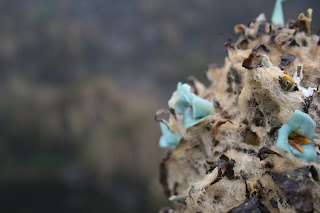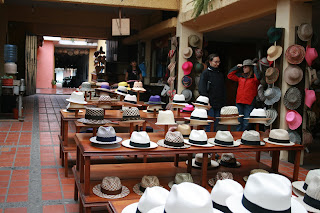
Thanksgiving in Cuenca
On Friday night my friend Becky came up from Loja, about 5 or 6 hours south of Cuenca, so that we could celebrate Thanksgiving together. I'd tried to get some other volunteers into Cuenca to have a little feast at my house/hostel, but Becky was the only one who wanted or was able to come in. It worked out fine however, because Lauren, who also teaches at the University of Cuenca, was hosting a little dinner at her house.After a quick dinner at Monday Blue we met up with some friends at a bar on Calle Larga called Red Candle. I'd never been there, but the atmosphere was friendly. Lauren was there with her friend Carol, a German woman who teaches at the University as well. Claire, who teaches at SECAP was hosting a little "class" with some students and her boyfriend, Stalin. Only about 7 of her 30-something students showed up, but it was cozy and perfect for the situation.
Though we were all supposed to be speaking in English for the benefit of the students, we were mostly using Spanish. We did find a fun game to play with both languages, however. "Limon, Medio Limon, Limon," is a game that is like a variation of many games back home. Everyone is assigned a number that you have to remember. Someone starts by saying, "Uno limon, medio limon, cinco limon," and the person with number 5 has to continue and say another number. If they mess up they have to drink.
We played this game in Spanish at first, and the foreigners kept screwing up by saying, "limon, medio limon, milon." We then switched to English and laughed as the students struggled. Sharing the fun for a few hours, Becky and I headed home around 2 am, as we were both tired from long traveling days.
On Saturday morning we walked around and Becky bought a panama hat, while I bought season 4 of The Simpsons for $5 and then another movie for $1.50. It's very easy to spend all of your money on movies here. Our plan was to make green bean caserole for the dinner, but we couldn't find the right ingredients at Supermaxi. Also, neither of us are good or creative cooks. So we settled on a can of corn and later on heated it up before heading over to Laurens' house. To be fair, we also brought some soda.
Lauren was nervous about cooking the turkey because she'd never done it before, and swore she'd never do it again after that night. For all of the worrying she did, the turkey came out great, as well as her stuffing. It wasn't a huge crowd, but rather 9 guests, most of whom were Ecuadorians. The Americans were Becky, Lauren, Claire, a new friend named Jamie, and myself. The Ecuadorians were Laurens' host mom, Sonia, her two friends both named Fabia, Stalin, and Israel, Carol's boyfriend.
As it turns out, Jamie just arrived in Cuenca last week to teach English for a year. Her mother is Ecuadorian and so she wanted to spend time with her family in Cuenca. She's from Massachusetts, and it turns out she knew someone from my hometown of Sharon. She couldn't remember the name for a few minutes, but eventually she said the name, "Silverberg," and I realized that she was talking about my friend Adam. They were friends together when they both studied in Madrid. Again, the incredible coincidences continue in Ecuador.
The dinner lacked gravy, cranberry sauce, mashed potatoes, and maybe other regular fixings at a Thanksgiving meal, but it was made up for in good friends to share the holiday with and a familiar feeling of doing something "American." Israel led a heated debate about sexism that seemed to go on forever, with the women getting angrier. Eventually it was decided that the three men should do the dishes to make up for it.
One thing we did that I've never done at a Thanksgiving meal before was go around the table and say what we were thankful for. It was nice and though we did it in Spanish, I think I got the message across. I was thankful to have friends in Ecuador to share the holiday with and for the food that we were sharing. After dinner some of us headed out to go dancing for a while, and as we danced in a circle to some crazy Ecuadorian songs, it was clear that we'd made some new friends. And I'm truly thankful for that.
It wasn't Thanksgiving in my grandma's boiling hot Brooklyn apartment, and I didn't get to spend it with my family, but it was a good day nonetheless. I'm not sure where I'll be spending Thanksgiving next year, but I'll remember this one for a long time to come.





































